|
|
|
Sort Order |
|
|
|
Items / Page
|
|
|
|
|
|
|
| Srl | Item |
| 1 |
ID:
174882
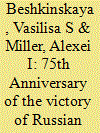

|
|
|
|
|
| Summary/Abstract |
The article studies events organized by the Russian authorities as part of the celebrations marking the 75th anniversary of the Victory in the Great Patriotic War of 1941-1945. The focus is on changes in the celebration plans due to the coronavirus epidemic, which made mass events impossible. The article analyzes the change of the target audience, the shift of the focus to the younger generation, the attempt to “extend the age of the participants” by emphasizing the contribution of the Home Front workers to the victory, changes in the exhibition at the Victory Museum on Moscow’s Poklonnaya Gora, reflecting new accents in the “great narrative” of war, and new trends in visual propaganda. Special attention is paid to the transformation of the Immortal Regiment civil event which went online. The article shows a connection between the commemoration of the 75th anniversary of the Victory and the domestic political agenda, primarily constitutional amendments, and foreign policy context.
|
|
|
|
|
|
|
|
|
|
|
|
|
|
|
|
| 2 |
ID:
174874
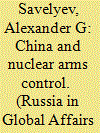

|
|
|
|
|
| Summary/Abstract |
Beijing explains its firm unwillingness to join the United States and Russia in nuclear arms control talks by the fact that China’s nuclear arsenal is incomparable with respective potentials of the world’s two leading nuclear powers. China urges Russia and the U.S. to go ahead with the nuclear disarmament process on a bilateral basis, and promises it will be prepared to consider the possibility of its participation in the negotiations only when its counterparts have downgraded their arsenals approximately to China’s level. Washington finds this totally unacceptable and demands that China either join the existing Russian-U.S. strategic New START treaty right away or agree to enter into a trilateral nuclear arms control format. This article studies the prospects of China’s involvement in nuclear arms talks and analyzes the true reasons behind Beijing’s desire to avoid any nuclear disarmament deals at this point. The working hypothesis of this paper is that China’s stance on the above issue is by no means far-fetched or propagandistic, and that it is driven by fundamental political, military and strategic considerations. Disregard for this factor and further forceful efforts to bring China to the negotiating table to discuss nuclear arms control will lead to failure.
|
|
|
|
|
|
|
|
|
|
|
|
|
|
|
|
| 3 |
ID:
174873
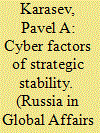

|
|
|
|
|
| Summary/Abstract |
It is hard to disagree with most international relations experts that nuclear arms control is currently undergoing a systemic crisis. Opinions differ on its depth and possible ways out of it. At the same time, many experts consider it necessary to conceptualize the factor of the latest information and communications technologies (ICTs), including artificial intelligence (AI) systems, in the domain of strategic stability. The matter concerns not only the digitalization of nuclear communications, command, control, and intelligence systems (C3I), but also the development and use of lethal autonomous weapons systems (LAWS).
|
|
|
|
|
|
|
|
|
|
|
|
|
|
|
|
| 4 |
ID:
174876
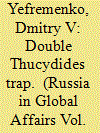

|
|
|
|
|
| Summary/Abstract |
Donald Trump’s presidency steered U.S.-China relations into a phase of open rivalry for global domination. The U.S. has failed to sidestep the risk of confrontation with China that Graham Allison warned of with his “Thucydides trap” metaphor. The two countries’ strongest trading and economic interdependence has proven unable to prevent a political standoff between Washington and Beijing. Their competition in science and engineering may result in the emergence of two technoeconomic platforms other countries will have to choose between. At the same time, the new U.S.-Chinese bipolarity is far more complex and internally controversial, which is a reason enough to postulate the existence of a “double Thucydides trap.” Importantly, global development is being greatly influenced by the interaction within the U.S.-China-Russia triangle.
|
|
|
|
|
|
|
|
|
|
|
|
|
|
|
|
| 5 |
ID:
174875
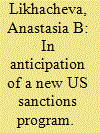

|
|
|
| 6 |
ID:
174877
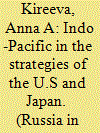

|
|
|
|
|
| Summary/Abstract |
The article seeks to analyze the Indo-Pacific strategies of Japan and the United States as key strategic actors in the region. It identifies their respective goals, how they are stated and what measures are being implemented. Drawing on primary sources in Japanese and English as well as academic literature, the article aims to clarify similarities and differences in the strategies, their distinctive features and how they can be explained. It demonstrates that both states view the Indo-Pacific as a strategic region where they would like to see a regional order based on certain rules and principles and free from China’s dominance. However, the American strategy has been formulated in a more antagonistic way, focusing on strategic competition, while the Japanese version is milder and employs stronger economic measures. Additionally, the article explores the significance of the findings for Russia’s policy in Asia, identifies challenges and opportunities, and proposes a recalibrated course.
|
|
|
|
|
|
|
|
|
|
|
|
|
|
|
|
| 7 |
ID:
174880
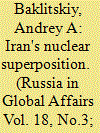

|
|
|
|
|
| Summary/Abstract |
The biggest positive factor is that the JCPOA is still alive and can be revived any time. Tehran has stated more than once that it will reciprocate as soon as the United States resumes its obligations. It is simpler to stop an undeclared war, pretending that it was never waged. On the negative side, the superposition could “implode,” resulting in one of two possible variants. Both the U.S. and the Israeli authorities would prefer the JCPOA to be “dead.
|
|
|
|
|
|
|
|
|
|
|
|
|
|
|
|
| 8 |
ID:
174879
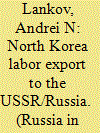

|
|
|
|
|
| Summary/Abstract |
The export of North Korean labor to Russia began in 1946 and continued, almost uninterrupted, until recently. The arrangements behind this labor migration project underwent dramatic revision from time to time, so we have to speak about three different periods: recruitment of North Koreans for work in fisheries in the 1940s and 1950s, dispatch of heavily controlled logging teams in the 1960s-1990s, and work of North Korean building crews, mainly on an autonomous basis, since the late 1990s. These periods reflect the way relations between the two states have been developing, and the change of their political concerns and interests. However, the underlying rationale has not changed much over the decades: the Soviet/Russian state needed cheap and docile labor, while the DPRK needed an additional source of hard currency and North Koreans were enthusiastic about getting lucrative job opportunities. On balance, both sides have been able to get what they hoped to get, and this has ensured the project’s long life.
|
|
|
|
|
|
|
|
|
|
|
|
|
|
|
|
| 9 |
ID:
174872
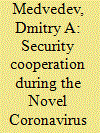

|
|
|
|
|
| Summary/Abstract |
The coronavirus pandemic compels us to reassess the main risks the world and individual countries, including Russia, are facing, and reconsider basic principles of international cooperation in global security. Urgent concerted efforts should focus on three major tasks: ensuring global and people’s individual security; enhancing law enforcement, including anti-terrorist programs with a special emphasis placed on cybersecurity and fight against bio-hazards; and promoting robust functioning of the global economy and national economies. The pandemic has set new requirements for sectors directly influencing people’s living conditions: education, healthcare, labor, recreation, the motivation system, etc. The response to the new challenges posed by the pandemic crisis must be universal, which implies consistent full-fledged interaction between governments, institutions, and businesses. It is important to strike a balance between the interests of the state and individuals, maintain due transparency, and share information, skills and various technological solutions.
|
|
|
|
|
|
|
|
|
|
|
|
|
|
|
|
| 10 |
ID:
174878
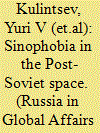

|
|
|
|
|
| Summary/Abstract |
A team of authors representing various countries of the Eurasian Economic Union analyzed anti-Chinese protests that took place in the 2010s in Russia, Kazakhstan, and Kyrgyzstan—EAEU countries that are China’s partners in implementing the Belt and Road Initiative. Based on empirical data concerning anti-Chinese protests, the paper examines the reaction of the authorities, public and expert discussion on the causes and further development of the situation, and offers some recommendations to the authorities of the countries in question on how to build constructive cooperation with China. An analysis of the causes and mechanisms of anti-Chinese protests in various countries shows that, despite some specific features, these countries face similar problems. The current situation can only partly be explained by the natural reaction of society to the continuing economic expansion of China. The basic reason for the protests was the lack of public trust in statements made by the authorities and the failure of existing government-society feedback mechanisms. As a result, society did not understand and rejected certain cooperation projects with China even though they were beneficial for the socioeconomic development of the countries and regions being considered.
|
|
|
|
|
|
|
|
|
|
|
|
|
|
|
|
| 11 |
ID:
174881
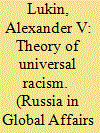

|
|
|
|
|
| Summary/Abstract |
Today the Western world seems to be witnessing the approach of a new totalitarian all-embracing theory that warrants the analysis of any social and historical phenomenon strictly from a “racial” (or anti-racist) point of view. Accusations of racism have been extending from public life not only to individual branches of knowledge, but also to science as a whole. These trends provide some insight into how international relations theory will evolve in the United States and Europe. The ideology of universal racism essentially consolidates American centrism by extrapolating the local American and partially Western European problem of racism to the entire world history, inflating it to the extent where it turns into the main, dominant factor of social development. Relying on its own tradition and inherent international nature, the Russian scientific school, together with non-Western modern and traditional approaches, can play a leading role in the criticism of this new American centrism and reverse racism, while maintaining objectivity and normality in international relations studies.
|
|
|
|
|
|
|
|
|
|
|
|
|
|
|
|
|
|
|
|
|